Here are some potent Plants That Naturally Repel Aphids! You can grow them in your home or garden to keep these pesky pests at bay!
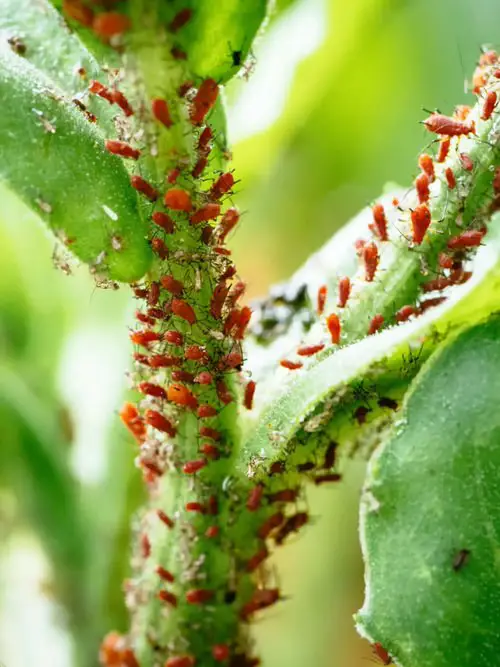
Growing Plants That Naturally Repel Aphids is the most organic way to keep these pests off your home and garden. We have included the best ones out there!
Plants That Naturally Repel Aphids
1. Garlic

Botanical Name: Allium sativum
Aphids, and many other pests, dislike garlic, especially the garlic cloves, which contain sulfur compounds. Also, the garlic has a strong scent that disrupts the aphids’ sense of smell, keeping them away from your garden and other plants.
Garlic can also be crushed and mixed with water and a little soap to spray directly on your plants to combat aphid issues.
A study also claims that garlic is one of the most potent plants that could be included in crops to decrease pest occurrence in neighboring crop plots.
2. Onion

Botanical Name: Allium cepa
Onions belong to the family of Allium, like garlic, and help in repelling aphids naturally. The scent of the onion will help control aphids and stop them from causing any damage to the plants.
A study states that it is one of the best intercrop plants to keep these pests away.
3. Catnip

Botanical Name: Nepeta cataria
Catnip can attract cats, but the scent can confuse bugs like aphids. Also, they can attract helpful insects that can help you control the heavy infestations of aphids.
4. Savory

Botanical Name: Satureja hortensis
Savory can be used to repel black aphids and can attract beneficial bugs like butterflies and bees. Grow it around vegetables to avoid the aphid infestation.
5. Rue

Botanical Name: Ruta graveolens
The strong scent and the bitter leaves of rue can repel aphids and act as a great companion plant for other vegetables or herbs in your garden.
6. Rye

Botanical Name: Secale cereale
It may not be a great companion plant, but research shows that it can potentially keep several pests at bay, such as aphids, spider mites, mealybugs, and roaches.
7. Marigold

Botanical Name: Tagetes
The strong fragrance of Marigold can make it difficult for aphids to demolish it. It also disguises the aroma of different plants and saves them from aphids. Not just that, marigolds also help against nematodes; discover more marigold benefits here.
8. Chives

Botanical Name: Allium schoenoprasum
Chives will naturally repel Japanese Beetles and aphids with their scent. Make sure to harvest it on time best flavor.
9. Neem
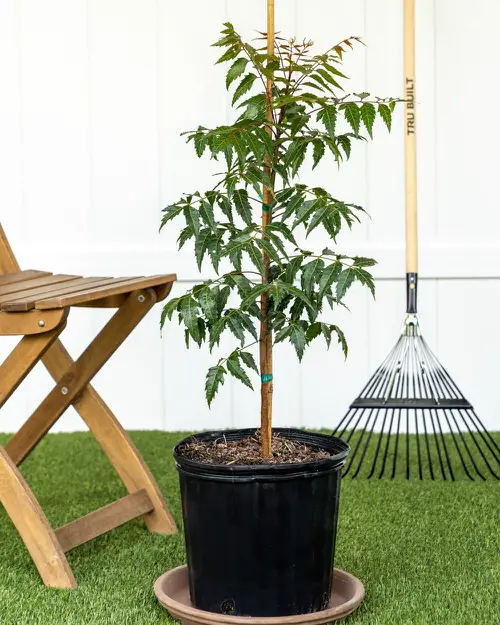
Botanical Name: Azadirachta indica
Due to the strong smell that neem possesses, aphids do not like to hover around it, never. The best part is that you can grow it in pots and crush its leaves now and then to keep these pests at bay. This miraculous tree possesses amazing powers to repel all kinds of pests and insects and can be grown as an annual in cold climates.
10. Eucalyptus

Botanical Name: Eucalyptus
Growing eucalyptus will only help you get rid of aphids if you will crush its leaves every once in a while and let the oil out. The fragrance will ensure these pests stay away from and around the plant.
11. Rosemary

Botanical Name: Salvia rosmarinus
Rosemary is another herb with a strong scent that can repel aphids and several other pests. However, if weakened, it might not be able to defend itself well against these pesky pests.
12. Lavender

Botanical Name: Lavandula
Lavender attracts aphids with its strong fragrance and calls out their stubborn enemies as well. The predators then come and feed them off the plant.
Excellent Trap Plants for Aphids
13. Parsley

Botanical Name: Petroselinum crispum
Grow Parsley to attract predatory wasps that can munch on the pesky aphids. These wasps can help you get rid of the aphid population if you tackle infestations from the beginning.
14. Mint

Botanical Name: Mentha
Mint is a fragrant herb that attracts beneficial bugs that feed on aphids. Grow it in the corner of the yard, where it will get all the attention of the pest.
15. Nasturtium
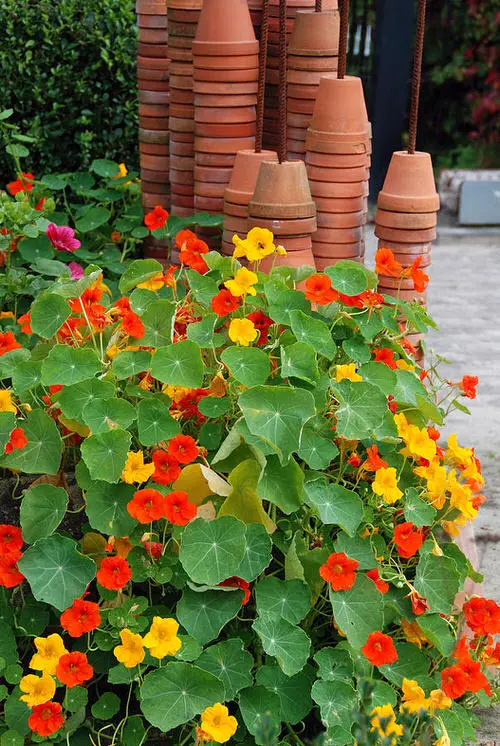
Botanical Name: Tropaeolum majus
Nasturtium also works as an excellent trap plant as its colorful flowers attract aphids. To keep vegetables and herbs safe in your garden, grow them around the edges and let them draw the attention of the pest.
16. Yarrow
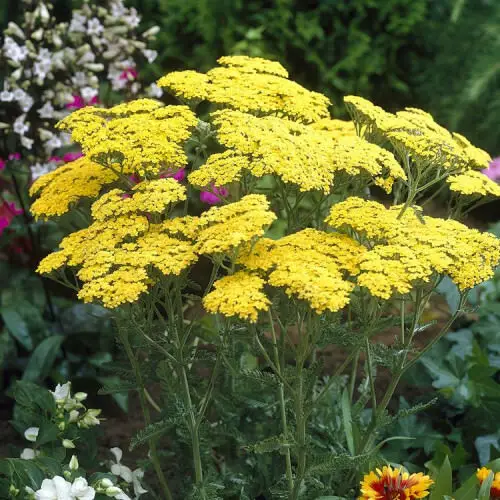
Botanical Name: Achillea millefolium
The benefit of growing yarrow is that it is good at attracting ladybugs, who love to feed on aphids. This is one of the most organic ways to control these pests in your yard. Also, check out more plants that attract ladybugs.
17. Geraniums
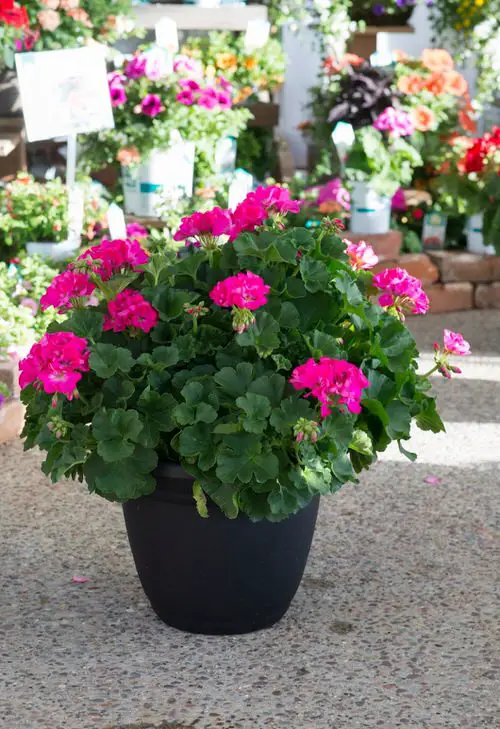
Botanical Name: Geranium
Geraniums, with their scalloped leaves and vivid flowers, can be a good trap crop for aphids, attracting their attention towards them, which will keep the other plants in your garden safe.
18. Sunflowers

Botanical Name: Helianthus
Sunflowers can act as another trap plant for your garden to keep aphids at bay. You can use these flowers to trap the whole colony of aphids, keeping them away from other plants.



Searched for “plants that repel aphids” because my mint plants keep getting infested with aphids. So since you claim mint repels aphids, now I doubt the rest of your list, too. Do you have links to research that backs up any of these claims? I’d like to read further into your sources.
Perhaps the aphid developed resistivity to mint as a result of mutation.
The first part of this article is plants that repel aphids. The second part is plants that “trap” aphids by attracting them and keeping them away from your other plants — mint was in the “trap” portion of the article.
Out of ALL my Rose plants that i have that has not been infested with Aphids as yet, is the only one that i planted with Marigolds at the base of the rose plant, so that’s what i’ll stick with to keep Aphids away from now on.